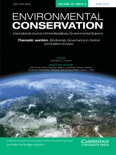
ENVIRONMENTAL CONSERVATION
Scope & Guideline
Empowering Solutions for a Healthier Planet
Introduction
Aims and Scopes
- Ecosystem Services Valuation:
Research focusing on the economic valuation of ecosystem services, particularly in relation to conservation efforts, helps to quantify the benefits provided by natural systems. - Community Engagement and Conservation:
Studies that examine the role of local communities in conservation practices, emphasizing participatory management and the socio-cultural dimensions of environmental stewardship. - Biodiversity Monitoring and Assessment:
Research that entails the monitoring and assessment of biodiversity, particularly in response to anthropogenic impacts, is crucial for informing conservation strategies. - Climate Change Impacts and Adaptation:
Investigations into how climate change affects ecosystems and species, alongside strategies for adaptation, are increasingly relevant in conservation discussions. - Policy and Governance:
Articles that analyze the effectiveness of conservation policies, governance structures, and their implications for sustainable environmental management. - Innovative Conservation Techniques:
Research exploring new methodologies and technologies, such as remote sensing and citizen science, to enhance conservation efforts and data collection.
Trending and Emerging
- Integrative Approaches to Conservation:
There is a growing trend towards integrative research that combines ecological, social, and economic perspectives, indicating a recognition of the complexity of conservation issues. - Urban Ecology and Green Infrastructure:
Research focusing on urban ecosystems and the role of green infrastructure in promoting biodiversity and ecosystem services is on the rise, reflecting increasing urbanization challenges. - Climate Resilience and Adaptation Strategies:
Emerging studies are increasingly addressing climate resilience, exploring how ecosystems and communities can adapt to changing climate conditions. - Technology-Driven Conservation Solutions:
The use of advanced technologies, such as remote sensing, drones, and machine learning, is becoming more prevalent in conservation research, enhancing data collection and analysis. - Socio-Ecological Systems and Governance:
There is an increasing emphasis on understanding socio-ecological systems and their governance, highlighting the interconnections between human actions and ecological outcomes.
Declining or Waning
- Traditional Wildlife Management Practices:
The focus on conventional wildlife management techniques seems to be waning, with a shift towards more integrated and community-based approaches that consider socio-economic factors. - Single-Species Conservation Efforts:
There is a noticeable decline in papers solely dedicated to single-species conservation, as the trend moves towards ecosystem-based management and holistic conservation strategies. - Static Land Use Studies:
Research that merely documents land use changes without integrating dynamic ecological or socio-economic contexts is becoming less frequent, as there is a growing demand for adaptive management frameworks. - Invasive Species Management:
Although still important, the frequency of research focused solely on invasive species management appears to be decreasing, possibly due to a broader focus on ecosystem resilience and holistic approaches.
Similar Journals

Annual Review of Environment and Resources
Advancing knowledge for a sustainable future.Annual Review of Environment and Resources, published by Annual Reviews, is a premier peer-reviewed journal dedicated to advancing the field of environmental science. With an impressive impact factor and recognition as a Q1 journal in Environmental Science, it ranks #2 out of 233 in Scopus, placing it in the 99th percentile of its category. Since its inception in 2003, the journal has provided comprehensive, accessible, and high-quality reviews that synthesize key developments and emerging trends in environmental science, making it an essential resource for researchers, professionals, and students alike. The journal is committed to promoting open access to vital research, reflecting the increasing demand for transparency in scientific communication. With its dedicated editorial team and extensive network of experts, the Annual Review of Environment and Resources continues to shape the discourse on environmental sustainability and resource management.

Nature Conservation Research
Leading the charge in ecological and environmental research.Nature Conservation Research is a prominent open-access journal that has been dedicated to advancing the field of conservation science since its inception in 2016. Published by the SARANSK FOND PODDERZKI & RAZVITIA ZAPOVEDNYH in the Russian Federation, this journal serves as a vital platform for researchers, professionals, and students alike, providing critical insights into ecological and environmental issues. With an impressive impact factor and ranked in the second quartile across multiple categories—including Agricultural and Biological Sciences, Earth and Planetary Sciences, Ecology, and Nature and Landscape Conservation—Nature Conservation Research stands at the forefront of impactful scientific discourse. The journal not only aims to disseminate high-quality research findings but also seeks to foster collaboration and innovation in conservation practices globally. By ensuring open access to its content, it promotes widespread dissemination of knowledge, crucial in the fight against biodiversity loss and environmental degradation. Researchers and practitioners contributing to the journal will find themselves at the convergence of science and conservation efforts, paving the way for sustainable ecosystem management.
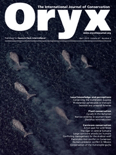
ORYX
Fostering Collaboration in Ecology and EvolutionORYX, published by Cambridge University Press, stands as a prestigious scholarly journal in the fields of Ecology, Evolution, and Conservation. With an ISSN of 0030-6053 and E-ISSN 1365-3008, this journal has been a critical platform for researchers and professionals since its inception in 1950. Recognized for its excellence, ORYX ranks in the Q1 quartile for both Ecology, Evolution, Behavior and Systematics and Nature and Landscape Conservation as of 2023, highlighting its influential contributions to the field. With a strong focus on disseminating innovative research and fostering collaboration among scientists, the journal covers a broad array of topics, from biodiversity and ecosystem services to conservation strategies and policy implications. As a result, ORYX provides invaluable insights that help shape the future of environmental science. Its impressive Scopus rankings place it in the top 80th percentile in its categories, further underscoring its importance and appeal among academics, professionals, and students alike.

ENVIRONMENTAL MANAGEMENT
Exploring interdisciplinary approaches to environmental management.ENVIRONMENTAL MANAGEMENT, published by Springer, stands at the forefront of advancing sustainability and ecological stewardship in the fields of Ecology, Global and Planetary Change, and Pollution. With an impressive tracking history from 1977 to 2024 and prestigious quartile rankings reflecting its significant impact (Q1 in Ecology and Q2 in both Global and Planetary Change and Pollution), this journal engages a wide range of stakeholders, including researchers, policymakers, and environmental professionals. The journal is a vital resource for those dedicated to addressing pressing global environmental challenges, publishing rigorous interdisciplinary research that informs policy and practice. While it does not offer open access, its content remains accessible through institutional subscriptions. Located in the heart of New York, ENVIRONMENTAL MANAGEMENT is dedicated to fostering a substantive dialogue on innovative approaches to environmental preservation and management.

Euro-Mediterranean Journal for Environmental Integration
Fostering Collaboration to Tackle Environmental Challenges Head-OnThe Euro-Mediterranean Journal for Environmental Integration, published by SPRINGER HEIDELBERG, serves as a pivotal platform for interdisciplinary research in the realm of environmental science, particularly focused on the unique ecological and socio-economic context of the Euro-Mediterranean region. With its ISSN 2365-6433 and E-ISSN 2365-7448, this journal aims to foster a collaborative approach to environmental challenges, integrating insights from various fields such as ecology, geography, and sustainable development. Since its inception in 2016, it has made significant strides, achieving a Q3 ranking in Environmental Science and maintaining a notable position within the Scopus rankings, sitting at #102 out of 233 in the general environmental science category, which reflects its growing influence in academic discourse. The journal is committed to open dialogue among researchers, professionals, and students aimed at advancing knowledge and promoting innovative solutions to pressing environmental issues. Access to its comprehensive articles and findings will be key to contributing to a more sustainable future.
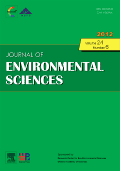
Journal of Environmental Sciences
Unveiling the Science Behind Environmental SustainabilityJournal of Environmental Sciences, published by SCIENCE PRESS, is a premier scholarly journal dedicated to advancing knowledge in the multidisciplinary fields of environmental science, environmental chemistry, and environmental engineering. Established in 1970 and based in Beijing, China, this journal has consistently garnered recognition for its high-quality research, demonstrated by its Q1 rankings across multiple categories, including Environmental Chemistry, Environmental Engineering, and General Environmental Science. With an impressive Scopus rank of #11 for Environmental Science, the journal has firmly positioned itself within the top tier of its field, attracting contributions from leading researchers and academics worldwide. Although it operates under subscription access, the journal's commitment to disseminating critical insights into pressing environmental issues makes it an invaluable resource for professionals, researchers, and students striving to make impactful contributions to the understanding and management of environmental challenges.

Global Ecology and Conservation
Unlocking insights for a thriving planet.Global Ecology and Conservation, published by Elsevier, stands as a premier open-access journal dedicated to advancing the field of ecology and conservation science. Since its inception in 2014, the journal has facilitated the dissemination of high-quality research, fostering critical dialogue on ecosystem management, biodiversity preservation, and sustainability practices across the globe. With a remarkable ranking within the top quartiles (Q1) in various categories including Ecology, Evolution, Behavior and Systematics, and Nature and Landscape Conservation, it is positioned among the leading resources for researchers and professionals alike. The journal has garnered a notable impact, ranking #65 out of 721 in Ecology, and houses articles that are vital to understanding and addressing the pressing environmental challenges of our time. Available in an open-access format, researchers can freely access and share vital findings, promoting a collaborative approach to ecological research. Global Ecology and Conservation is not just a publication; it is a critical tool for innovation and advocacy in conservation, poised to inspire the next generation of environmental stewards.
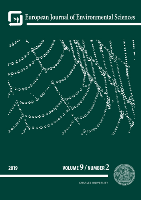
European Journal of Environmental Sciences
Innovating Insights into Pressing Environmental ChallengesEuropean Journal of Environmental Sciences is a prominent open-access journal dedicated to disseminating high-quality research in the field of environmental science. Published by Charles University, Faculty of Mathematics & Physics, this journal has been a vital platform since 2011, facilitating free access to insightful studies and findings pertinent to pressing environmental issues. Its scope encompasses crucial topics in Ecology, Management, Monitoring, Policy, Law, Nature and Landscape Conservation, and Pollution. With a significant presence in the academic community, the journal currently holds a Q3 and Q4 category ranking in various subfields of environmental science, as assessed in 2023, showcasing its relevance and impact in the discipline. Researchers, professionals, and students engaging with the European Journal of Environmental Sciences will find it an essential resource for enhancing their understanding of environmental challenges and contributing to innovative solutions.
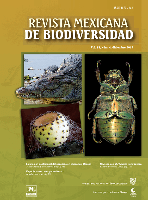
Revista Mexicana de Biodiversidad
Pioneering Research for a Greener TomorrowRevista Mexicana de Biodiversidad is a prominent academic journal dedicated to the field of biodiversity and conservation, published by the prestigious Instituto de Biología, Universidad Nacional Autónoma de México. Since its inception as an Open Access publication in 2005, it has aimed to disseminate high-quality research that advances the understanding of biological diversity in Mexico and beyond. With an ISSN of 1870-3453 and an E-ISSN of 2007-8706, the journal caters to a diverse audience, including researchers, professionals, and students, by providing vital insights into ecological studies, conservation strategies, and the sustainable management of natural resources. The journal is committed to fostering scientific collaboration and promoting the significance of biodiversity in addressing contemporary environmental challenges. By publishing innovative and impactful research, the Revista Mexicana de Biodiversidad plays an essential role in the global discourse on biodiversity conservation.
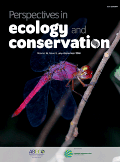
Perspectives in Ecology and Conservation
Exploring critical perspectives in ecology and environmental management.Perspectives in Ecology and Conservation, published by Elsevier Science Ltd, is a leading academic journal dedicated to advancing the fields of ecology, conservation, and environmental management. With a Q1 ranking in multiple categories, including Ecology, Management, Monitoring, Policy and Law, and Nature and Landscape Conservation, this journal boasts an impressive standing among its peers, making it essential reading for researchers and professionals. Since its inception in 2017 and running through 2024, it aims to provide innovative perspectives and critical analyses that enhance our understanding and practices in conservation science. The journal is accessible through open access options, facilitating broader dissemination of knowledge. Its commitment to addressing contemporary ecological challenges reinforces its importance in the academic community, promoting sustainable practices and informed policy-making in the face of urgent environmental issues.